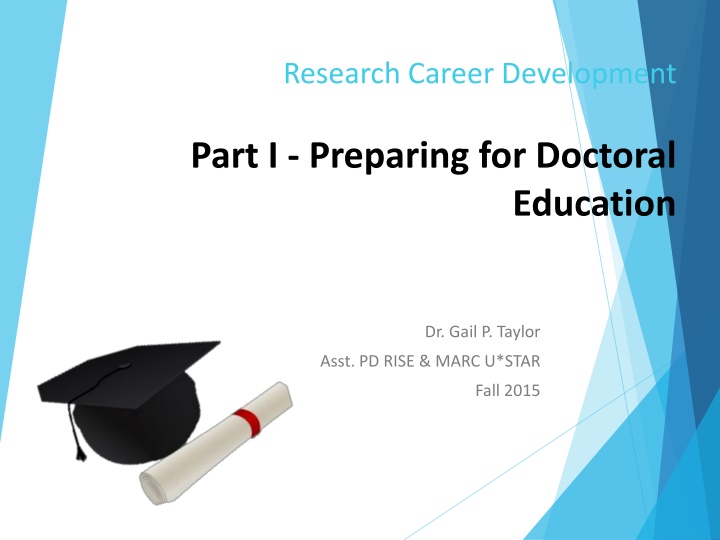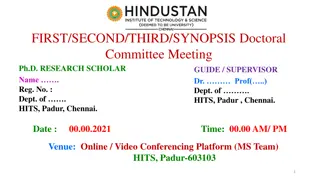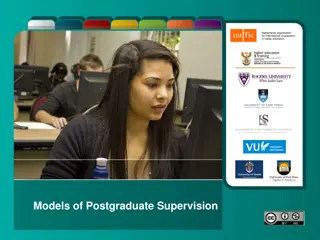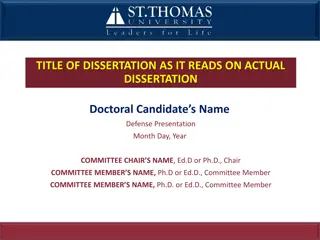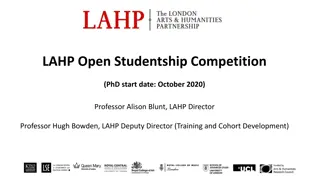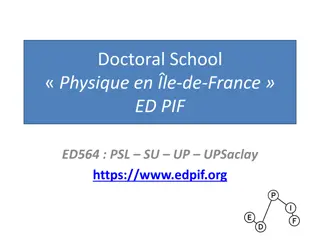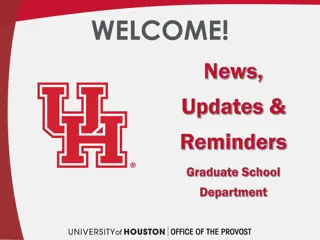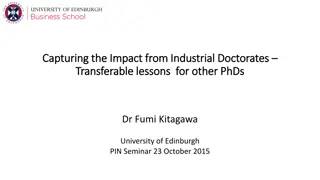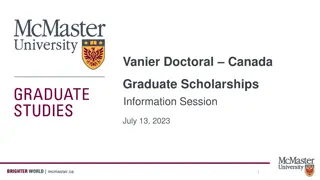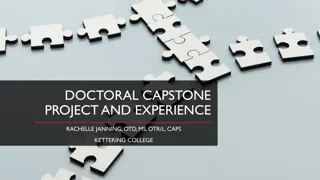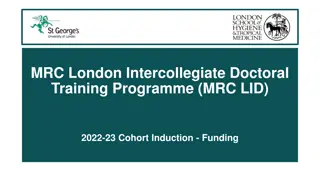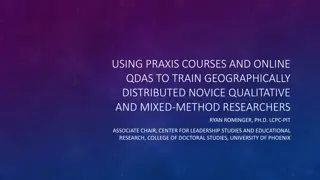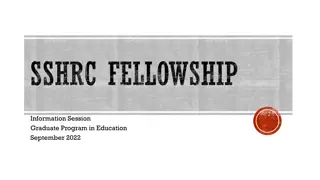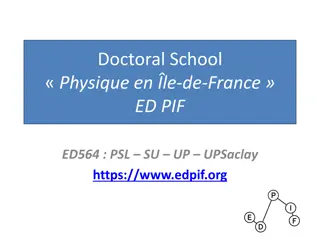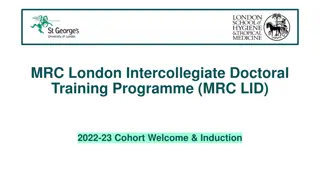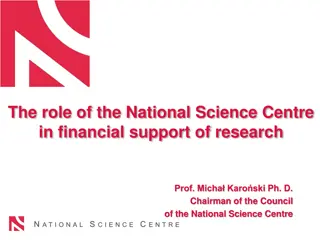Essential Steps for Preparing for Doctoral Education
Understand the challenges and motivations for pursuing doctoral education. Learn what doctoral programs look for in candidates, including skills, background, and independence. Prepare by setting a clear vision, building a strong CV with research experience, publications, and leadership roles.
Download Presentation

Please find below an Image/Link to download the presentation.
The content on the website is provided AS IS for your information and personal use only. It may not be sold, licensed, or shared on other websites without obtaining consent from the author.If you encounter any issues during the download, it is possible that the publisher has removed the file from their server.
You are allowed to download the files provided on this website for personal or commercial use, subject to the condition that they are used lawfully. All files are the property of their respective owners.
The content on the website is provided AS IS for your information and personal use only. It may not be sold, licensed, or shared on other websites without obtaining consent from the author.
E N D
Presentation Transcript
Research Career Development Part I - Preparing for Doctoral Education Dr. Gail P. Taylor Asst. PD RISE & MARC U*STAR Fall 2015
Confirm and Commit! Graduate School is Challenging Clarify to YOURSELF on why you want to go Understand motivations Become a Scientist Science culture See yourself as a researcher Develop Identity Mature into next stages Talk and and act
What are your thoughts on the prior slide?
What do grad schools look for? Think and we will discuss
What Doctoral Programs Want SOMEONE WHO WILL SUCCEED!!! Has background required for success Coursework (strong performance) Knows culture of science (frustration?) Knows research (pubs, presentations, etc) Has motivation required for success Programs, summers, internship, presentations, etc. Has skill or potential to perform activities of science Performed research Thinks like a scientist Communication (oral and written) Potential for Creative independent thinking
Cont - What Doctoral Programs Want Maturity will grow, but need basics Reliable, independent, takes instruction Thinks like scientist Fits well with their program Compatible research interests with faculty Potential for independent investigator Impact energy of school Good representative forever Increase diversity?
PREPARE - Make Clear to Others That you want PhD Program! Set vision early Self (I am a scientist) PI (advice, strategize for App) Become what you want to be Have Grit! Become what GS want to induct PREPARE
PREPARE - Build CV Research and Related Activities For GS and Grants Research Experience Depth (start early; dig in; literature) Quality (where and who) Quantity Responsibility THINK Pubs/Conferences/Presentations Positive shows you know culture Oral Presentations > Poster, but both good Authorship highly regarded (but not necessary) Teaching Meaningful volunteer/science promotion Leadership
PREPARE - Academics Grades are a student s job. GPA (UD most important) 3.7 very good (but better for Harvard ) 3.5 solid 3.0- Some schools will admit Sub-3.0 Rare and exceptional cases. C s are failing. Courses/Electives (choose challenging and for field) Don t take courses for the first time in GS CAN make up undergrad courses in GS Grades are balanced with letters, pubs, interview Scientists usually weren t 4.0 in biosciences
PREPARE - GRE Required by nearly all schools (some ignore) Will also count on some grants PREP is possible Vocab, Practice tests, nail math Try to get ~300 combined (don t despair) Take spring or summer prior to applying, if possible Can retake Overcome by letters, pubs, interviews http://news.vanderbilt.edu/2014/06/grit-better-than-gre/ http://www.nature.com/nature/journal/v510/n7504/full/nj7504- 303a.html
PREPARE - Letters of Recommendation Testimony on your skills and suitability Research Best. PI! Summer. Postdoc Character (tho in Chem Instructors better)
Get your Act Together on Applications! Plan summer programs Research due dates Create planning worksheet Coordinate recommenders Investigate schools and possible PIs Plan Statement(s) Plan schedule (Final Summer, Fall, Spring)
Strengthening Credentials GRE: Study for and retake Grades: Possibly begin M.S. training and get A s Postbacc with Academic Prep More Research/Preparation//Better letters Job as Research Asst. Postbacc
Research Career Development Part II Choosing a Doctoral Program Dr. Gail P. Taylor Asst. PD MBRS-RISE & MARC U*STAR Spring 2012
Doctoral (PhD) Training Takes Place Graduate Programs or Graduate School At Universities http://www.utsa.edu/graduate/ Academic Medical Centers & Vet Schools http://gsbs.uthscsa.edu/main/ Special Partnerships HHMI Janelia Farms Research Campus http://www.hhmi.org/janelia/grad.html NIH Graduate Partners https://www.training.nih.gov/programs/gpp Avoid online or unfunded programs
MANY MANY FIELDS Neurobiology/Neuroscience Physiology Microbiology/Immunology/Endocrinology Cell/Molec./Dev. Biology Biochemistry/Biological chemistry Biomedical Engineering Chemistry Green Organic Manufacturing Pathology/Molecular Toxicology Pharmacology Program in Integrated Sciences Radiological Sciences Biostatistics Electrical Engineering Ecology and Evolutionary Biology Environmental Health Sciences Epidemiology Oral Biology Biological and Medical Informatics Biophysics Civil Engineering Genetics Computational Biology/Bioinformatics Pharmacogenomics Forestry Integrative Biology Translational Research Molecular and Biochemical Nutrition Plant Biology Vision Science Etc., etc
Program/School Metrics Time to Degree Degree Completion Degree requirements Courses, research rotations, Qual exams Location Size, schools, culture, job for spouse, cost of living, transportation Size of School Total size, # Doctoral students Campus environment Academic (courses, library, etc) Retention programs and GS training (grant writing??) Cultural and social activities Diversity of student population?
Program Metrics II Financial Considerations Funded? Stipend & Tuition? Fellowships and Traineeships payment for study Research Assistantship Payment for work Teaching assistantships Payment for teaching Med Insurance?
Even more Important -Focus on Faculty School should have several of interest Performing research that inspires Ability as educators and mentors Ability as scientists Grants RO1 http://grants.nih.gov/grants/funding/r01.htm Publications Nature, Science Awards Nobel Prizes National Academy of Sciences Members http://www.nationalacademies.org/ Know how to Play the game of science Mentoring vs Reputation
Programs Vary Quality of Ed Launch of graduates Treatment of UR students Talk to professors/Your Mentor! Professional Societies Talk to students Investigate/meet faculty Talk to recruiters (grain of salt) Go to Summer Program Graduate Fairs Online (societies, ratings)
Program Descriptions Descriptions of Schools (take with grain of salt): http://www.petersons.com/graduate-schools.aspx http://www.gradschools.com http://www.cgsnet.org/ http://www.graduateguide.com/ http://www.phds.org/rankings/
Program Rankings (PI Better) Rankings! US News Grad School Rankings http://grad- schools.usnews.rankingsandreviews.com/best-graduate- schools/top-science-schools PhDs.org http://graduate-school.phds.org/rankings Times Higher Education University Rankings https://www.timeshighereducation.co.uk/world- university-rankings/2015/world-university- rankings#/sort/0/direction/asc
Final Decisions Often comes down to PI Are they supportive to URM students? Funding? This is a big decision that you must make on your own .
